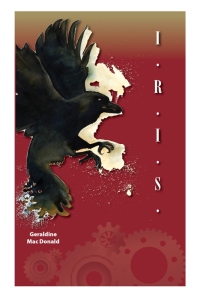It’s grade three, and today is your turn for Show and Tell. You put on your best shirt, go to school wearing nerves of steel, swallow back that lump in your scratchy throat; and as soon as the bell rings and Ms. Landry hustles the others into the classroom, you reach into your desk and pull out a…
If there’s one thing I’ve learned over these past few years, while reinventing myself as a creative writer, it’s this: there’s a massive difference between ‘showing’ and ‘telling’ a story.
But why does it matter?
Good fiction, to me, is all about creating a visceral and emotional link, which is done by engaging the reader’s senses. A good story, like a thief at midnight, sneaks past that intellectual barrier known as ‘disbelief’, to grab hold of our minds and dig deeper into our selves.
It makes you feel like you are really there in some magical way.
Sure, but it takes more than that!
Yes. It does! You’ll notice I’ve already used metaphor and simile, tried to show you character traits, and almost placed a smoking gun on the stage to create suspense (reference a glossary of literary devices), because good fiction does all those things too! But the difference between telling (cataloguing characters’ actions and emotions, covering ground, informing or instructing readers in some way) and showing (evoking sensations and creating images in readers’ minds) can be the difference between fair stories and remarkable ones.
In fact, you need both to write right. So let the reader SEE it.
Here are some examples:
Tell: Lynn felt scared.
Ho hum. Blah-bee-dee-blah. Okay then. So Lynn was scared. So what?
Show: The hair on the back of Lynn’s neck pricked. Her breathing came in short rasps. She looked over her shoulder and shivered in chills…
Oh, now we’re talking… Can you relate? Have you ever felt that way? What’s happening that is causing Lynn to feel so frightened?
But what if you have a word limit? Sometimes you progress more by using more words, and sometimes you just need to say it quickly, in a few words (style matters too, but that’s another story).
Tell: Bob seemed angry lately.
Show: Bob slammed every door.
Show: Bob fumed.
Keep in mind that your choice of words can also give insight into the compelling characters that you are developing, and all of that makes for superior fiction!
Tell: Jane wanted to know why Sam kept shutting her out. He refused to answer her many questions.
Show: Jane pelted Sam with questions like she was the Red Baron bombing London. Sam blew smoke rings back in reply.
Does that example show and tell you anything more about your characters? If desperate Jane keeps pestering silent Sam how will he respond? Is he going to be gentle and sweet? Or is he going to explode?
And the differences can be striking or subtle but a good writer can manipulate things.
Tell: “Come on,” Judy said impatiently.
Show: “Come on!” Judy urged.
In the above example we’re told that Judy is impatient. In the second line we are shown, through use of a stronger verb and an exclamation point, that Judy, for some reason, is impatient.
Use strong verbs so you can avoid adverbs.
Tell: Lou walked down the street, happy to finally be going home.
Show: Lou skipped homeward, swinging her hips and whistling.
Tell: Joe wrote messily on the paper (*verb needs adverb to modify and help create image).
Show: No one could read Joe’s writing (*character trait developing).
Show: Joe scribbled something illegible (* better verb choice).
Show: Joe’s writing was chicken scratch (* show using metaphor).
Darla walked softly up the stairs.
Darla crept up the stairs.
Darla slunk, snuck, floated, crawled, slithered up the stairs…
Darla inched up the stairs, holding her breath and listening.
Let the readers discern for themselves how they feel.
When reading, I dislike being told how to feel, don’t you? Like…
Tell: Lily turned and suddenly, when she least expected it, he was standing there before her.
Show: Lily closed her car door, turned around and banged straight into someone. But it wasn’t just anyone. It was him.
Or,
Tell: Luke was the kind of guy who made Sarah feel dirty when she stood beside him.
Show: Sarah was jostled into the elevator beside Luke, with his sweat-stained armpits and his breath that smelled like yesterday’s staff meeting. She looked downward, hoping for a draft of air and dreaming of her white-tiled shower.
But don’t be ambiguous.
Tell: Karla was well-dressed.
What does that mean to the reader? What does the writer want it to mean? It’s all relative to one’s opinion of what well-dressed means, isn’t it?
Show: Karla wore a pristine silk pant-suit with a delicate crocheted shawl. Her hair was coiffed like the ladies on the streets of old Paris and her nails were manicured to glossy perfection.
The second example shows the reader what the writer thinks well-dressed means.
The writer could also say:
Tell: Karla was enigmatic.
Or better yet,
Show: When Karla entered the room all heads turned to see.
Show: When Karla walked down the street men in passing cars honked their horns and other women adjusted their skirts and fixed their lipstick.
Tell: Stan was mean by nature (what does ‘mean’ mean?)
Show: Stan kicked the neighbour’s dog when he thought no one was looking.
Tell: Alice was shy around others (is ‘shy’ the same as introverted?)
Show: Alice hid behind her mom’s legs whenever strangers spoke to her in public, but giggled until her body shook when playing with friends at daycare.
The truth is, it takes all of this and more to craft a ‘good’ story that others would want to read (what is a ‘good’ story?).
But the showing is always in the telling.
The morning bell reverberated off the painted brick walls and vibrated the vinyl window blinds until they hummed. Kids scrambled to kick off wet shoes and line them against the wall as they hopped over puddles into their dry classroom.
Ms. Landry stood at the front wearing her usual pink and white smile until the National Anthem finished singing.
“Shhhhh, take your seats please,” she said. “That’s quite the June rainstorm we’re having isn’t it? Okay everyone it’s Geraldine’s turn for Show and Tell. Johnny, sit! Would you like to come forward Geraldine?”
Every pair of eyes in the room from twenty-seven heads swivelled around to stare at Geraldine in her back row seat. She gulped, and reached into the dark spaces of her desk where her hand made a fist around the object she’d waited so long to share. She glanced at the clock and stood up, ignoring the sweat that trickled down her back as she marched forward to stand beside her favourite teacher: the one who had encouraged her to see beyond the ordinary.
“What have you got for us today?” Ms. Landry asked with eyes that twinkled.
Geraldine lifted her closed hand and glanced sideways to smile at her teacher before thrusting her hand forward, open, with the palm facing up, for the everyone to see.
“What is it?” Johnny yelled.
Mike stood on his chair. Laura did too. Kids craned their necks and grumbled until the entire class was standing, and some were pushing their way forward, trying to get a better look the way people do at rock concerts and Boxing Day sales.
“That’s just a dumb old button.” Arlo said before he plopped back down onto his seat.
“Yah,” Bryce scoffed.
Someone else laughed.
The inseparable Maya and Luna giggled and whispered to each other, having hoped for something a little more exciting, cute and fuzzy, or larger and louder with flashing lights like the robot June’s dad had brought in two days earlier.
“Class!” Ms. Landry raised her voice. “SIT DOWN.”
They all shuffled and stilled.
“Geraldine, please tell us what you have and why you want to share it.”
Geraldine spoke in her mouse-like voice that took everyone several attempts to hear over the commotion that one tiny button had caused.
“This is a button from my grandma’s jacket that she wore during World War II,” she whispered, staring not at her classmates but at the ornate, tarnished brass dot that rested in her open palm.
There was a collective gasp from the group.
“COOL!” Johnny yelled.
“My grandma worked at breaking German codes. She was very good at math…”






